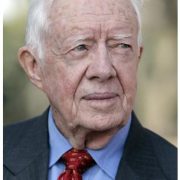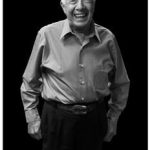Sunday With President Jimmy Carter
When I heard that our 39th president, former governor of Georgia, and Nobel Peace Prize winner, Jimmy Carter was coming to town, I moved heaven and earth to meet him.
I served in the White House Press Corps as the The Economist correspondent during the latter part of his term, and was dying to get answers to issues that were then classified, or unknowable.
It was tense and politically charged, but a highly productive time. He signed a treaty handing back the Panama Canal, brokered the Camp David accords between Israel and the Palestinians, signed the SALT II Treaty limiting nuclear weapons with the Soviet Union, and normalized diplomatic relations with China.
Then the good will created by these accomplishments went up in smoke when Iran seized 52 hostages by storming the American embassy in Tehran, an ordeal that lasted 444 days. It was a national nightmare and a very dark time for America. That smashed his reelection chances in 1980, and paved the way for Ronald Reagan to ascend to the presidency.
During the seventies, his administration was looking for an American who spoke fluent Japanese and knew Japan?s steel industry inside out. It turned out that I was the only one, having covered the industry on a daily basis for the Sydney based? Financial Review.
I was offered an appointment as Deputy Assistant Secretary of the Treasury for International Affairs, which I turned down because the pay was too low ($15,000 a year for a G-14). It was the biggest mistake I ever made, leaving millions of future potential lobbying fees on the table. Such are the errant ways of youth.
Carter showed up to our meeting in a modest grey suit, red tie, and a thinning mane of pure white hair. He was animated, with a relaxed sense of humor, but answered his questions with rapid-fire succession. Not only was he fully briefed on developments in every country of the world, he personally knew the leaders of many. Touch on issues he deeply cared about, and he responded with fire and brimstone.
One of the great things about interviewing old ex-presidents is that either the events in which they have confidential knowledge have passed their statute of limitations, or they can?t remember if they were classified or not. So having an extended conversation can be very interesting, to say the least. Such was the case with my two hour talk with Jimmy Carter. I will try to summarize what he said.
The former president argues that the United States is now the most unchallenged superpower in history. It is not only the most powerful nation on earth, but in all of human history.
However, despite this unprecedented strength, the country is pulling back from the ideals that made it great in decades past. Once the leader on the environment, we now lag far behind Europe. By using drones to assassinate Americans abroad, we are disavowing the Geneva Convention. Our commitment to human rights has wavered. Half of the 160 prisoners at Guantanamo Bay have never been charged, and are effectively serving life sentences. We now have the largest prison population in the world, up sevenfold in 30 years.
We are the most warlike nation in modern history, and have almost continuously been involved in combat for the past 70 years. The long list of adversaries includes Korea, Lebanon, Vietnam, Cuba, Cambodia, Laos, Grenada, Panama, Nicaragua, Iraq, Serbia, Kosovo, Afghanistan, Iraq again, Somalia, Libya, and most recently Yemen. Next on the menu are Syria, Iran, and Mali. The leadership of many countries live in terror of us. Such a long history of conflict reflects a serial lack of desire to negotiate on our part.
We have retreated from our domestic principles as well. The concentration of wealth at the top continues unabated, with the top 1% seeing a 400% rise in net worth, while the rest of us have seen declines. College tuition has soared from 4% to 10% of family income. Poverty has risen by 31% in just the past five years.
Massive infusions of money into the political system have created a hopeless gridlock in the government, making it impossible to do anything about our problems. His own presidential campaign in 1980 cost nothing, as it was entirely financed with public money. In 2012 both parties spent $6 billion.
Most of this money went into negative TV advertising that so poisons the atmosphere that the winners refuse to talk to each other when they get to Washington. Carter thinks that the Supreme Court?s Citizens United decision, open the way for unlimited anonymous corporate donations, was ?stupid.?
The native of Plains, Georgia said that it was not clear that Iran had decided to develop nuclear weapons, but they certainly had the means to do so. Even if they had such an offensive capability, it is unlikely they would ever use it. Israel has over 200 operational nukes, and the slightest hostile move by Iran would result in them being wiped off the face of the earth. Iran has no desire to commit national suicide.
Nor does North Korea, which has to face America?s 5,000 nuclear bombs. The Clinton administration had a peace treaty written up and ready to sign with Kim Il Sung in the late nineties, ending 45 years of hostilities. Then George W. Bush got elected president and he threw it in the trash. That panicked the North Koreans into a crash program to develop nuclear weapons and intercontinental missiles. The first successful test occurred in 2006.
Carter is a regular traveler to the Hermit Kingdom in order to keep back channels open, where he sees starving children as the cruel face of our economic sanctions. He still believes that North Korea would dump its nukes if we reoffered the peace treaty, when the proper initiatives were taken.
Carter has been visiting China since 1949, when his sub made a brief stop just before the Nationalist collapse. He personally knows the new leader, Xi Jinping, well, and thinks the Middle Kingdom will never pose a military threat to the US. The Carter Center has monitored elections in 650,000 towns and villages there for the past 15 years, where the communist party is not active.
He sees our largest trading partner moving towards full democracy over time. He is assisting in implementing the country?s first Freedom of Information Act. In fact, China has the world?s most rapidly growing Christian population today, with total numbers soon to exceed 100 million. They are also the planet?s largest publisher of the Bible.
The former president is discouraged about developments in Israel, where the Benjamin Netenyahu administration seems hell bent on colonizing the West Bank as quickly as possible. This eliminates the possibility of a two state solution, which the Palestinians and every other country in the Middle East have already said they would sign on to.
Carter sees the Arab Spring as a hugely pro-American development, as every country in which it has unfolded has moved from dictatorship to democracy. But don?t expect every country to elect a leadership in our image. Of course, Egypt is going to choose the Muslim Brotherhood, a country that is 90% Muslim! The new Mohammed Morsi government was the most moderate of several alternatives, and should work well with the US. (He has a PhD in engineering from one of my alma maters, the University of Southern California).
What makes Carter such an interesting person to speak to today is that he has become the most active and hard working ex-president in history. For the last 31 years he has run the Carter Center , a well funded non profit that promotes global peace, advances public health, monitors international elections, and promotes women?s rights.
The Carter Center has just monitored its 93rd foreign election, in the West African country of Sierra Leone. It has almost completely eliminated Guinea Worm, cutting the number of global cases from 3.5 million to only 542. It has treated 75 million cases of trachoma and 12.8 million cases of river blindness.
Despite his strong anti-war stance, Carter insists that he is not a pacifist. He has served on two battleships and three submarines, and came to office with more military experience than any other modern president after Eisenhower.
Jimmy Carter grew up on a farm in rural Georgia during the Great Depression. Childhood diversions included raising a great number of different birds and animals, and searching for pottery fragments left by ancient Indians who once inhabited the land.
He wanted to become a naval officer from the age of five, following in the footsteps of an admired uncle in the US Asiatic Fleet of the twenties and thirties. That led him to Georgia Tech, Annapolis, and eight years in the Navy. His specialty was nuclear engineering, and he served on the Seawolf, America?s second nuclear submarine.
Carter?s memory for numbers was nothing less than stunning for someone born in 1924. When he was growing up in Plains, his father charged him with managing the black tenant farmers. He became a second son to many families, often sleeping over in ramshackle shacks sharing bed bug bites.
He paid daily wages of $1 for a man, 50 cents for a woman, and 25 for a child. Finally, the workers went on strike because they were starving. His father threatened to fire everyone to show that organizing labor was futile. But he gave them the quarter raise they needed after the following New Year so they could eat. It was definitely another time and another place. When I told Carter I wanted to be like him when I was 88, he laughed.
I had to ask him about Argo, the Iran hostage rescue movie nominated for Best Picture at the Academy Awards. He said that it greatly overplayed the role of the Americans. After being turned away by the British embassy, the Canadians ended up doing 90% of the work, and bore most of the risk in the effort to spirit six Americans out of the country.
If it were discovered they were hiding Americans, they too would have been overwhelmed and taken prisoner. To observe the letter of the law, the Canadian Parliament met in secret for the only time in its history to give the approval. The facts aside, Carter said Argo was a wonderfully entertaining movie.
That was spoken like a true diplomat.











